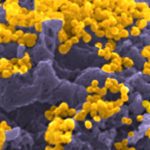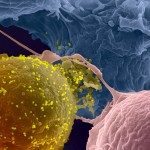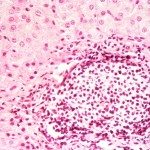Lien vers Pubmed [PMID] – 39391808
Lien vers HAL – pasteur-04748459
Lien DOI – 10.20411/pai.v10i1.752
Pathog Immun 2024 ; 10(1): 1-11
First-generation anti-SARS-CoV-2 monoclonal antibodies (mAbs) used for prophylaxis or therapeutic purposes in immunocompromised patients have been withdrawn because of the emergence of resistant Omicron variants. In 2024, 2 novel mAbs, VYD222/Pemivibart and AZD3152/Sipavibart, were approved by health authorities, but their activity against contemporary JN.1 sublineages is poorly characterized.We isolated authentic JN.1.1, KP.1.1, LB.1, and KP.3.3 viruses and evaluated their sensitivity to neutralization by these mAbs in 2 target cell lines.Compared to ancestral strains, VYD222/Pemivibart remained moderately active against JN.1 subvariants, with a strong increase of 50% Inhibitory Concentration (IC50), reaching up to 3 to 15 µg/mL for KP3.3. AZD3152/Sipavibart neutralized JN.1.1 but lost antiviral efficacy against KP.1.1, LB.1, and KP3.3.Our results highlight the need for a close clinical monitoring of VYD222/Pemivibart and raise concerns about the clinical efficacy of AZD3152/Sipavibart.

















